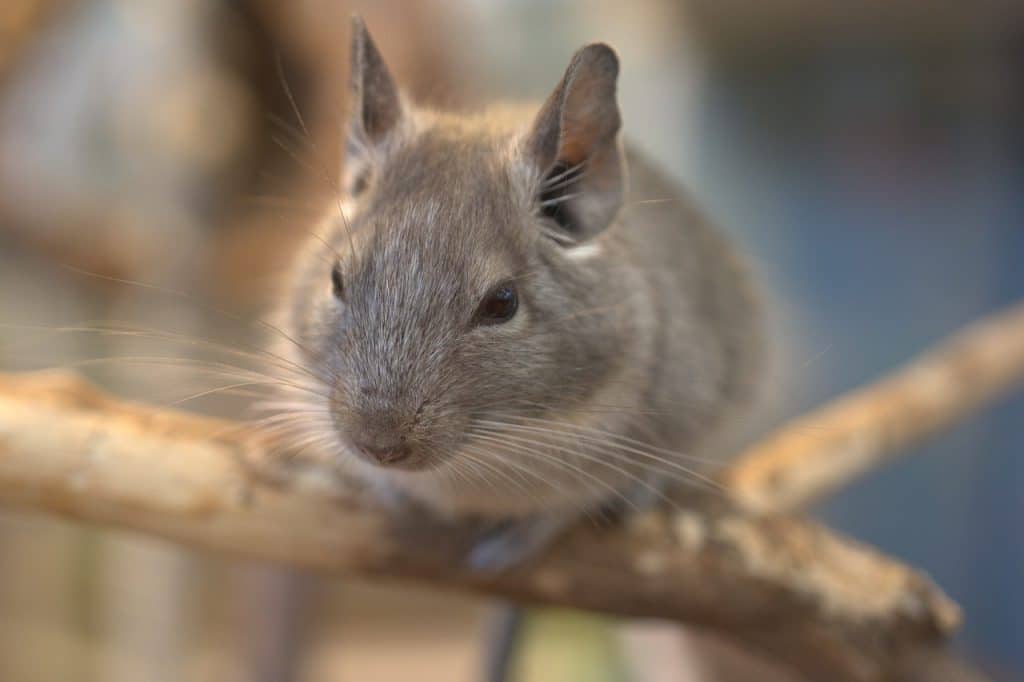
Chinchillas are generally quiet, but they have unique sounds they use to communicate and express their emotions. These sounds can make it difficult for novice Chinchilla owners to understand and can cause stress.
It will help you to care for your Chinchilla and cater to its needs by knowing the sounds they make and why. Knowing the sounds your Chinchilla makes will help you to know when they’re happy or sad. This article will help you to understand these sounds and get to know your Chinchilla better. Let’s get started!
1. Low, gentle squeaking
The sound of a low, gentle, and irregular sound that is accompanied by a high-pitched, whistling sound is usually an indicator that everything is well in your Chinchillas’ world. This sound can be heard by other Chinchillas as well as you to indicate that your Chinchilla is happy and content and that all is well.
2. Continuous squeaking
This sound sounds similar to a gentle squeaking sound but is more urgent and continuous. It’s usually an indication of excitement. This could be the Chinchilla seeing a familiar Chinchilla, seeing its owner, or being fed. This sound is usually associated with extreme happiness and excitement. However, they may make similar sounds when in distress. Make sure to check with your Chinchilla if you hear them making this sound.
3. Barking
Chinchilla barking can sound like a duck quacking. It is rhythmic and urgent. This sound is usually made to warn other Chinchillas about danger, predators, or between males. When fighting, males often make the same sound.
4. Teeth grinding
Teeth grinding is a sign that a Chinchilla is happy and content. This sound is usually made by a Chinchilla when they feel secure and happy. It’s often heard when they are being cuddled or enjoying a delicious treat.
5. Screaming
This is a high-pitched, loud scream that sounds similar to squeaking, but much more urgent. Chinchillas will scream when they feel afraid, in distress, or in pain. You may have seen or heard something that your Chinchilla considers a predator or may have inflicted injury on themselves. You should immediately check on your Chinchilla if they make this noise.
6. Spitting (kicking).
Kicking is the name for a sudden, sharp, or loud coughing sound. This is usually a sign that your Chinchilla has gone into defense mode or is angry. They will normally be fine if they are allowed to calm down and spend some time alone. However, if they keep doing this, it could be a sign that they are having other problems.
7. Teeth chattering
Rapid teeth chattering can be a sign of anger, self-defense, or a warning to stay away. However, this may not always be true. Some Chinchilla’s chatter when they are happy and content. It is important to understand the context of chattering. You will be able to see if your Chinchilla is angry or content by their body language.
8. Fighting
Chinchillas make the same sound as barking when they fight. However, it is more urgent and frantic. You will notice a more irregular bark and a different volume and rhythm when there is a fight. It could be a fight over territory, food, or a female. You’ll likely need to separate the males into different enclosures.
Last Thoughts
Although Chinchillas are very quiet, they can still produce many different vocalizations. These sounds can be very helpful in caring for your Chinchilla. The more time you spend with them, the better they will sound.
It is important to keep in mind that almost every Chinchilla sound comes with a context. You, the Chinchilla owner, will be able to tell them what they need before they start making these sounds.
When chinchillas are happy, what sounds do they make?
Cooing. This is a sure sign that your rodent is content and everything is fine. Chinchilla’s coo to greet one another or to show their owners that they are having a good time.
How do you tell if a chinchilla is content?
A chilled chinchilla that has bonded with you will prefer that you sit on the floor and let them hop all over you while making little chattering sounds and excited tiny squeaks. Some people may even enjoy a little cuddling. A giddy chinchilla will eat popcorn and bounce around all over the place.
How do you gain a chinchilla’s trust?
Speak softly and comfortingly to your chinchilla, but do not attempt to touch him. It’s best for him to get used to your voice while you’re still separated by cage bars. Your chinchilla will become more at ease over time and may come up to the side of the cage to greet you when you enter the room.
How can I tell if my chinchilla is unhappy?
The following are symptoms of stress or fear in your chinchillas: Making noises, such as whistling or barking. Hiding. Chewing on fur, either their own or that of another chinchilla.
What are chinchilla squeaks?
Squeaking can indicate a variety of things depending on its volume and frequency, but in almost all cases, low gentle squeaking sounds indicate that your chin is happy and healthy. When a chinchilla squeaks gently, it is communicating to you or your other chinchillas that it is safe and happy.
Chinchillas make what kinds of noises?
Chinchillas typically scream when they are scared, distressed, or in pain. Your Chinchilla may have heard a loud noise, seen something that they perceive to be a predator, or injured themselves in some way. If you hear this sound from your Chinchilla, you should immediately check on them.
How do you calm a wrathful chinchilla?
Put on some soothing music. Music therapy is effective in relieving stress in a wide range of animals, including humans. You can play music for your chinchilla to help it sleep or while it is playing outside of its cage to make it feel more at ease.